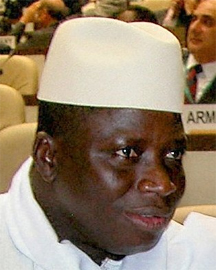BANJUL, (Reuters) – Gambian President Yahya Jammeh benefited from a strong media bias and greater financial resources than his rivals to secure a new five-year term in elections, the African Union said on Saturday.

Former military coup leader Jammeh scored a landslide 72 percent victory on Thursday to extend his 17 year-rule over the tiny West African country, criticised for alleged human rights abuses and press-muzzling.
“Although provision was made for equal access of all political parties and candidates to the public media, the actual coverage was strongly weighted in favour of the candidate of the ruling party,” the AU observer mission concluded.
“The gross imbalance in the financial and material capability of the candidates may have resulted in the lack of adequate visibility of the United Democratic Party (UDP) and the Independent candidates,” it said of his main challengers.
The bloc found that there were no acts of intimidation during voting on Friday and concluded that despite the failings, “the results are a true reflection of the will of the sovereign people of The Gambia”.
Results showed Jammeh won 470,550 votes, while his closest rival Ousainou Darboe got 114,177 votes, or 17 percent. Independent candidate Amath Bah scored 11 percent. Many analysts saw the incumbent’s victory as a foregone conclusion.
Addressing thousands of cheering supporters in the capital Banjul, Jammeh said Gambia would one day have the best standard of living not only in Africa but in the world too, and called on rivals to work with him.
“Those who have lost should come together, so we can work as one … I will turn this country into a superpower of peace and economic better in four years time,” he said.
Gambians have an average income per head of around $1 a day.
Earlier, Darboe urged Gambians to reject the election as rigged, while Bah complained of insufficient access to media and funds to campaign properly.
One of Africa’s most controversial rulers, Jammeh announced in 2007 that he had a herbal concoction that cured AIDS, but only on Thursdays, a claim derided by health experts. He has been criticised for reported threats to human rights groups and a 2008 order for all homosexuals to leave Gambia.
Jammeh’s standing abroad has been further strained by spats with Senegal and Guinea, while the West African body ECOWAS said this week it would not send an observer mission to the polls because it doubted they would be free and fair.
Gambia is one of only handful of African states not to have diplomatic ties with China because of its recognition of Taiwan.
